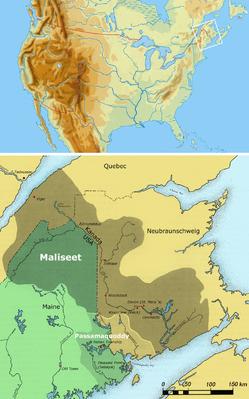The Penobscot (Abenaki: Pαnawάhpskewi) are Native Americans and First Nation from the Northeastern Woodlands. Their language is part of the Algonquian language family. They are part of the Wabanaki Confederacy. The US government recognizes the Penobscot Nation as a tribe. They are in the regions of Maine, Atlantic provinces and Quebec. Their name means "the people of where the white rocks extend out."[2]
Pαnawάhpskewi | |
|---|---|
| Total population | |
| 2,278 enrolled members[1] | |
| Regions with significant populations | |
| 2,278 (0.2%) | |
| Languages | |
| Abenaki, English | |
| Religion | |
| Wabanaki mythology, Christianity | |
| Related ethnic groups | |
| Abenaki, Maliseet, Mi'kmaq, Passamaquoddy | |
The Penobscot did hunting. They moved for different seasons.[3] They traveled in birch bark canoes. They hunted and fished at different times of the year. They joined the fur trade. They traded furs and got goods like alcohol. Many Natives died from European diseases. They were not immune to these diseases. Penobscot encountered French in Canada and English in New England. They supported the Americans in the American Revolution. However, Americans began to push Penobscot off their lands.[3] They were forced onto reservations. At the turn of the 19th century, the Penobscot gave up most of their land to Massachusetts. They could only stay on the Penobscot Indian Island Reservation. The tribe has sued the state of Maine several times. These have included issues like the right to hunt and land claims.[4]

Penobscot made baskets. They used sweet grass, brown ash, and birch bark. Baskets became more decorative with European trade.[5]
For the Penobscot, the lands have spiritual importance. Religion was closely connected to land. The landscape was part of a larger cosmology. Thus, land was very important for the Penobscot. A key figure in legends is Klose-kur-beh (Gluskbe). He gives the Natives practical and spiritual knowledge. He is as old as creation. According to Penobscot cosmology, Gluskbe warned about the greed and lust of white men. Animals and plants also had spiritual elements.[6][7] Natives converted to Christianity when Europeans arrived.[3]
Maps showing the approximate locations of areas occupied by members of the Wabanaki Confederacy (from north to south):
- Maps of the Wabanaki Confederacy areas
- Miꞌkmaq
- Eastern Abenaki (Penobscot, Kennebec, Arosaguntacook, Pigwacket/Pequawket)
- Western Abenaki (Arsigantegok, Missisquoi, Cowasuck, Sokoki, Pennacook
Wikiwand in your browser!
Seamless Wikipedia browsing. On steroids.
Every time you click a link to Wikipedia, Wiktionary or Wikiquote in your browser's search results, it will show the modern Wikiwand interface.
Wikiwand extension is a five stars, simple, with minimum permission required to keep your browsing private, safe and transparent.



